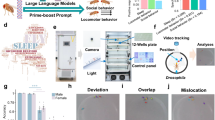Abstract
DURING my work with house flies (Musca domestica L.) I noticed one day that the bodyless heads of about ten flies all made drinking movements when their tongues came in contact with sugar water, but, probably due to quick desiccation of the œsophagus, no sugar water ever passed through this passage. After some time, the sucking movements became more vigorous and then rather suddenly stopped. In the case of flies with their tongues forcibly in touch with sugar water, the pumping activity of the fulcrum, even when the crop was full, never ceased. Only the contra pressure from the crop prevented a further intake. These experiments suggest that the sucking reaction takes place independently of the hunger- or thirst-condition of the fly.
This is a preview of subscription content, access via your institution
Access options
Subscribe to this journal
Receive 51 print issues and online access
$199.00 per year
only $3.90 per issue
Buy this article
- Purchase on Springer Link
- Instant access to full article PDF
Prices may be subject to local taxes which are calculated during checkout
Similar content being viewed by others
References
Thomsen, E., Videnskab. Medd. Dansk Naturh. Forening, 106 (1942).
See Wigglesworth, V. B., “The Principles of Insect Physiology” (1942).
Author information
Authors and Affiliations
Rights and permissions
About this article
Cite this article
BOLWIG, N. Hunger-Reaction of Flies (Musca) and the Functions of their Stomatogastric System. Nature 169, 197–198 (1952). https://doi.org/10.1038/169197b0
Issue Date:
DOI: https://doi.org/10.1038/169197b0
This article is cited by
-
Coordination of a dual inhibitory system regulating feeding behaviour in the blowfly
Journal of Comparative Physiology A (1986)
Comments
By submitting a comment you agree to abide by our Terms and Community Guidelines. If you find something abusive or that does not comply with our terms or guidelines please flag it as inappropriate.



